Off road racing is great to watch, great to take part in but hellish to organize. Competitions - some are good, some are not, some are one day, others are a week or more. And just as the types vary, so do the reasons for going to one of them. For some its the prize, for others its the company or the adventure. Whatever it is, its common in each and every one of us who choose to test their skills alongside others.
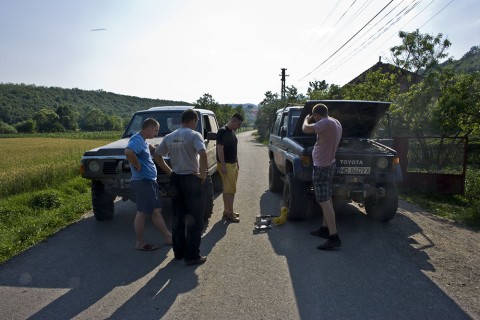
But whats on the other side? Who are the people that make this happen? How are the races thought up and what are the logistics required for organizing one of these events?
Regardless of the race, there are some items on the checklist that they all have in common. Safety, insurance, legal issues,
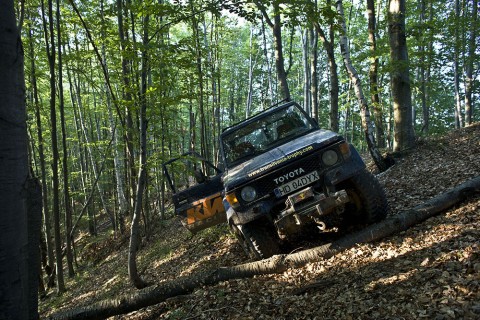
This is where it all begins. The people who work together and rise up to the challenge to give you a difficult but entertaining event every time. From the people who answer your mails to those who do the tracks to those who serve your food all of them added to the overall quality of the competition.
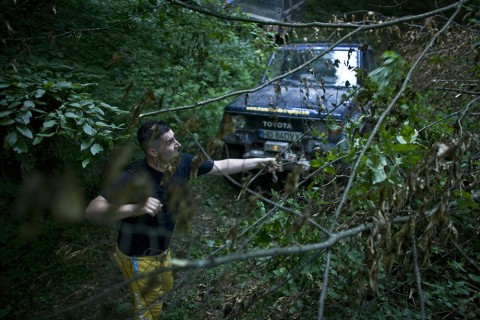
When organizing any sort of competition, but in particular a multi-day one, its crucial to assign clear tasks and duties to each and every member just as it is important to have each and every task, regardless of how insignificant it may seem catered by one or more members of the team. In doing so, you insure a good flow and avoid the situation where you might have tasks without people or the other way around.
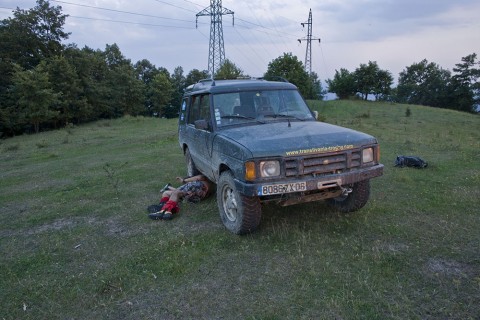
Its also important to take into account the peoples skills and personalities. Problem solvers are good in administrative positions, where they can be of most use, while people with less initiative or desire to be pro active can cover less demanding but just as important positions such as referee. Regardless of the choices for positions, the team needs to be chosen in such a manner that all members get along well. When this happens, the overall harmony in the organization side of the race is passed on to the competitors who, after a hard days work of mud and rocks, are welcomed with friendly faces who serve them dinner, brief and advise them on any matter they might be unsure of. They never need to know that behind their feeling good lay discussions, stress, compromises and worries.
Lets face it: were human. We live in society. We need schedules, for everything. If anything doesnt go according to schedule, everyone goes ballistic. Invariably.
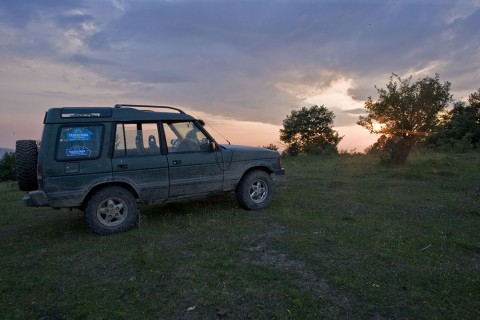
Off road is not much different. On the contrary, the extremes are more similar than the rest of situations thus having a well defined schedule is crucial to the good flow. If you have a website for the competition, upload the schedule there, as detailed as possible because people love to know these things. They will go on the website every two days, months before the race and will try to imagine how will things go every morning what will they have for breakfast, what will break on the cars in each possible stage. Why? Because thats what keeps our enthusiasm from surcharging our brain.
What happens at the race? The schedule needs to be followed. Its a bible and people will have it printed or, in some cases remembered. Its not a train station but it needs to be as close to the way you imagine the events unfolding as possible. Its true that, the bigger the number of participants, the more difficult keeping to the schedule will be. In difficult days, cars can take up to 24 hours to finish a stage. As an organizer you cant send them racing in the next stage 30 minutes later, without a fixed and refueled truck, food or water. These are the times that the will provide a good reason to alter the schedule, but they are rather rare and only occur on some difficult competitions. More often than not, the whole reason for delaying and not synchronizing is lack off efficient communication which is bound to inevitably happen wherever, whenever and to anybody.
Behind the cars, award ceremony and any such things lies paperwork. A races most uncomfortable aspect and one that needs to be done before and during the competition. To this particular area I will dedicate an extremely small amount of time and space, as its surely far from anyones chosen topic of discussion.
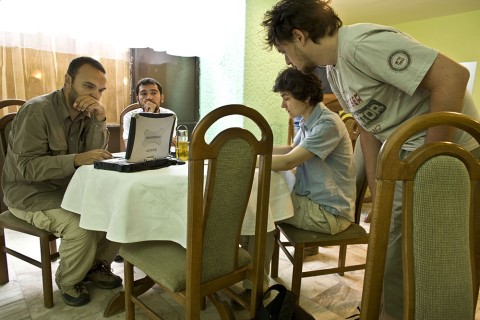
The most important aspect of the bureaucratic impediment is getting approvals. In order to be allowed to drive anywhere, you should get approval from the countys authorities, local mayors of villages that you might enter on your way and the county police. The difficulty of the process varies with the situation so theres nothing you can actually expect beforehand, but can hope for a smooth process.
Another important aspect are the papers that competitors sign when enrolling in a race. Details of the pilot and copilot, blood types and driving license numbers are among the basic requirements you should also consider full disclosure forms to be signed (regardless of what anyone says, its still a potentially dangerous activity and passing the responsibility over to the competitors clears the organizational team of possible law suits). Just to be on the safe side, a small insurance booth should be present in the registration area for any late comers who didnt have time to get a life insurance or any sort of auto insurance.
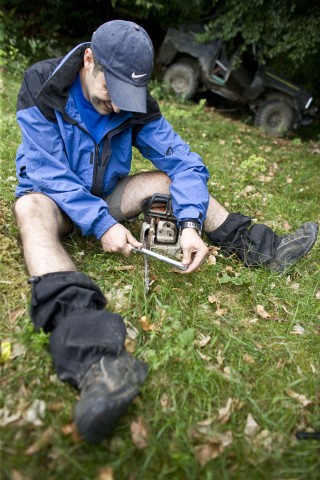 These are two of the aspects with most possible variations, of all the organization process. Its obvious that a one day competition is very different in needs from a multi-day trophy. Keeping a well tended to logistics list as well as trying to foresee any possible problems that might arise are two tasks that can decide the success of the gathering.
These are two of the aspects with most possible variations, of all the organization process. Its obvious that a one day competition is very different in needs from a multi-day trophy. Keeping a well tended to logistics list as well as trying to foresee any possible problems that might arise are two tasks that can decide the success of the gathering.
Firstly lets talk about accommodation and comfort. If youre going to have a single day race thats not a problem, unless you have people coming one or two days before. If youre going to have a multi day race, camping or hotel will be needed. In our latest race we were faced with having to fit a few hundred competitors, assistance, press and organizing people in more than one location, thus communication was to some extent made difficult. Usually, for a large group, the hotel you choose to use will throw in a discount for hiring out a big number of rooms in a short period of time. As a rule of thumb, its advisable to stay at the same location while scouting for the tracks, as you might get a discount for staff.
Inevitably problems will arise at any and every accommodation. Accidents, broken objects, missing towels and such trivial issues can disturb the overall flow of the day. Trying to solve them with diplomacy makes the team be easily trusted by both competitors and accommodation staff.
Next comes what weve all been awaiting. Camping, if its a multi day event. Nobody wants to go to a competition and stay in the hotel. Its much like driving a limousine on dirt roads. Just doesnt kick off. Camping and adventure is what off roads all about but we must never ever forget that were much too used to our daily urban lives to go the extra mile and stay right in the wild. Hence the camping area and its utilities. In the last competition we needed to provide comfortable camping conditions in two camps for more than two hundred people/camp which included hot meals in the evening, hot showers and clean running water, electricity from generators and many more. Its the little things that matter so having hot water until past midnight as well as keeping food warm for all competitors regardless of how late they arrived were important tasks.
Reporters, photographers and cameramen are just as important, if not even more important than team or competitors. A good review can boost up the competitions participation while a bad one can plummet the credibility far lower than most organizational mistakes.
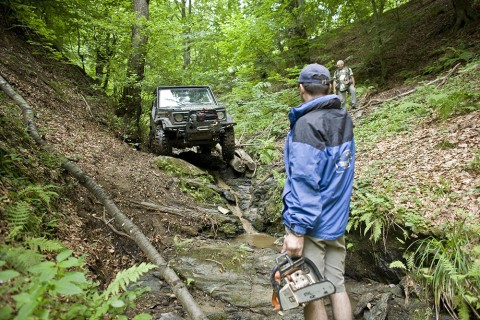
Firstly and most important, there needs to be a press pack for all press t-shirt, prospectus, additional information, schedule, tracks, useful contacts and such. Furthermore there needs to be a designated vehicle (organization car which usually leads the press convoy) which has to lead the press trucks to every important hot spot throughout the race. Every day the member of the organization that tends to the press convoy must have all the information that they might require such as number of cars still in the race, reasons for abandoning, leader board and so on. Keeping a well structured connection with the press group means less chances for miscommunication or additional complications. At the end of the day, the world of off road racing relies to some extent on the good publicity that it receives.
The tracks are made much in the same style as they are read. A pen and paper, marking down all the positions. Before doing this you need to have a car with a trip master/ terra trip installed. Its a simple process, the installation. Its just a matter of hooking the device to the battery (can be done directly) and fixing the sensor and its metal plate on the end of the prop shaft closest to the transfer box.
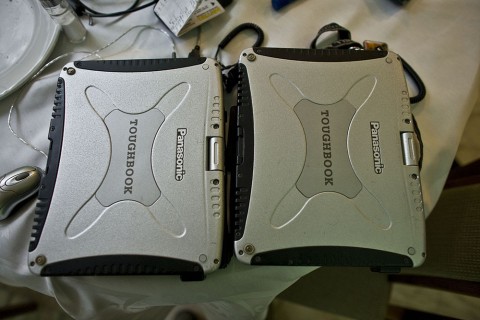
With each rotation of the shaft, the sensor records the metal plate passing and, after calibrating it, you can accurately measure the distances between two chosen points. Each position (i.e. river passage, intersection, forest entrance/exit) must be carefully noted down alongside the distance between two points. These numbers can be introduced in a Road Book software, such as RBEditor or Touratech which do the job quite nicely, calculating intermediate and total distances, and giving you the option to add, modify or alter all the classic symbols for intersections.
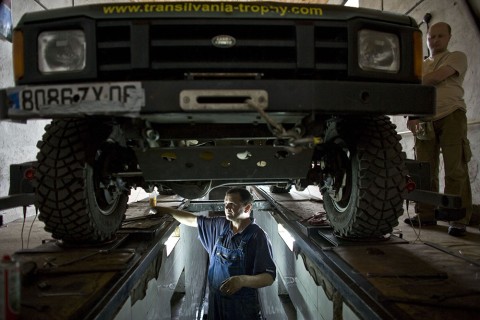
As a rule of thumb, with a good car you can do a days track for open class in about two days, if you know what youre looking for. While doing so, its worth mentioning that you should consider various adjacent points of entry, in case the organizing team needs to pick up a broken car off the tracks, or any similar matters.
During this last race, we implemented a new system for marking and checking the tracks for organizers. We purchased trackers which are these little yellow devices that leave a track wherever the car has gone. Really what they do is remember a collection of GPS points (maximum 150 000 points) that, overlapped on Google Earth, give you a pretty accurate depiction of where the car has gone. This aided a lot in giving up conventional checkpoints and replacing them with virtual ones. The accuracy and the degree of attention paid to checking the trekkers and overlapping paths can gravely influence the race results. Like any new technology first implemented, issues arose regarding batteries and software issues but even so the trekker system proved to be a very helpful one
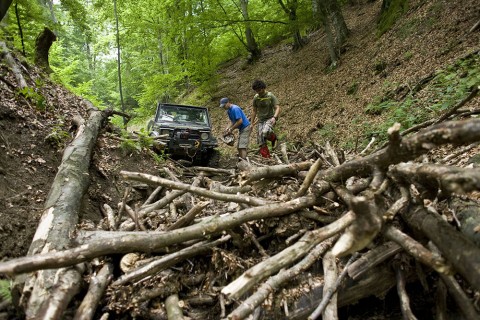
Looking back on everything weve learned, Its easy to understand why an article would be a small part of everything there is to tell about organizing an off road competition. Ive tried to keep it as simple and concise as possible. Its always easy to forget that, after all these pains of setting everything up and making everything come together, its all about trying to build an event people will remember and come to again and again.